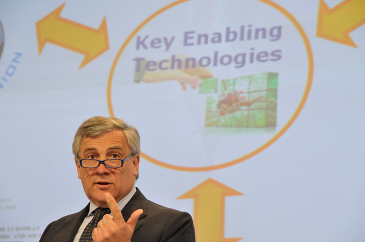Industry and Entrepreneurship
Innovation
Innovation is oxygen for enterprises

Innovation is oxygen for enterprises. Those who do not innovate and do not keep up with technological developments gradually lose market shares and eventually risk going out of business. Without oxygen, they cannot breathe.
Innovation comes from investment. Industry has always been a key actor in this field. Manufacturing is the strongest contributor to the EU private sector Research and Development, contributing to 80% of total investment. But more needs to be done.
European research is world leading in many sectors and is responsible for filing many cutting edge patents, but has not always been so good when it comes to translating scientific leadership into industrial advantage. The situation in lithium batteries is a clear example of this, with European firms holding more than 30% of the relevant patents, without any production of such batteries taking place in the EU.
"Investment in innovation is vital to maintaining our global competitiveness and reviving growth in Europe. Without innovation we will not achieve our goal of raising industry’s contribution to GDP to 20%, a target we have set in our new strategy on industrial policy. This makes it more and more important and increasingly urgent to coordinate these policies at the European level."
Moreover, innovation efforts remain patchy and unevenly spread across the EU. More worryingly, the latest European Commission's annual innovation scoreboard delivers a picture of a widening gap between the most innovative countries and those lagging behind.
Innovation should become a common goal to which all EU member states aim, coordinating national efforts. To facilitate such a development, the Commission has launched plans for a genuine Innovation Union and proposed a common strategy to push investment in specific innovative sectors, which are deemed to drive innovation in the wider EU economy.
Our Industrial Policy has six priority areas for investment in innovation. These include: access to finance, stimulating entrepreneurship, stimulating innovation demand, and non-technological innovation.
Another focus area for our efforts is what we call Key Enabling Technologies (KETs), which include micro- and nanoelectronics, advanced materials, industrial biotechnology, photonics, nanotechnology and advanced manufacturing systems. The global market for KETs is forecast to increase by over 50% from €646 billion to over €1 trillion by 2015, which is equivalent to around 8% of the EU's GDP.
Such new technologies will revolutionise engineering (e.g. intelligent materials) and transform the production of goods (e.g. 3D printing), as well as providing game-changing new foundations for traditional markets, such as smart grids, clean vehicles or bio-based plastics. While we are interested in high-tech industries, in parallel we also support all the important innovations of European low- and medium-tech SMEs.
Innovative products do not come from nowhere. They are usually the result of decades of small improvements on existing technologies. Europe lies on a technological goldmine, being one of the most technology-advanced and technology-dominated regions of the world. Little additional efforts can provide enormous results, building on our huge technological endowment.

